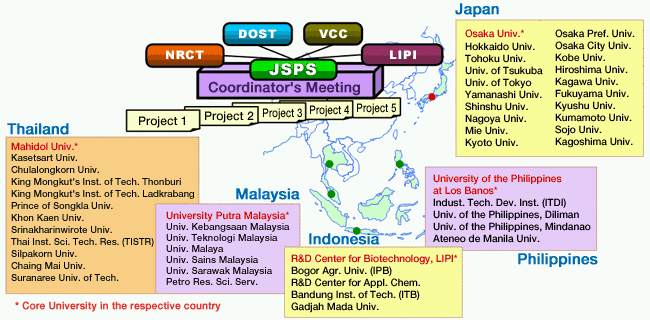JSPS: Japan Society for the Promotion of Science (1978-2002)
Outline
In the 21st century, problems of food shortage, energy shortage and environmental destruction will arise inevitably through the steady increase of human population. To solve these issues, development in research and technology on “Sustainable utilization of bioresources” is necessary. Bioresources are abundant and diverse in Southeast Asia, but recently its diversity has been diminishing rapidly. This situation makes us realize that the preservation and sustainable utilization of bioresources in Southeast Asia is a global necessity.
Under these situations, after the effecting of “Convention of Biodiversity” in 1992, which declared that the original country has the sovereign authority to access bioresources, all countries in Southeast Asia went into action to protect their diversity-rich bioresources. However, at the same time, these countries set the sustainable use of the bioresources as priorities and promoted world-wide collaboration of researchers for human benefit.
Japan Society for the Promotion of Science (JSPS) Bilateral cooperative research with Southeast Asian countries was launched in 1978 as the Core University Program to cope with the common issues. Scientists in the field of biotechnology from leading Japanese universities acknowledge the importance of the bioresources in Southeast Asia, and started cooperative research with Thailand on the theme “Microbiological Engineering in Agro-industry” with the leadership of ICBiotech. The mutual understanding through this program allowed Japanese scientists to share the information concerning the bioresources in Southeast Asian countries. The cooperative research program with Thailand was then expanded to cover all fields of “biotechnology”, and also cooperative researches with other Southeast Asian countries such as Philippines, Indonesia and Malaysia started in the 1980s.
In 1995, the cooperative program was amended to “the Multilateral Large Scale Cooperative Research Program in the field of Biotechnology” to establish an intimate network among researchers in Japan, Thailand, Philippines, Indonesia and Malaysia. By this networking, researchers from these countries have been dealing with the allotted researches to solve issues of common importance among the Southeast Asian countries. This program (10 years) is designed in three phases, and at present the program is at the 3rd phase, focusing sharply on five specified projects as follows:

| Progress of cooperative researches with Southeast Asian countries under the JSPS Core University Program | |
|---|---|
| 1978 | Start of bilateral cooperative research with Thailand under the Core University Program Field: Microbiological Engineering in Agro-industry |
| 1984 | Start of bilateral cooperative research with Singapore under the Core University Program Field: Biotechnology |
| 1985 | Reorganization of the bilateral cooperative research with Thailand into the Core University Program Field: Biotechnology Start of bilateral cooperative research with Philippines under the Core University Program Field: Biotechnology(Annual seminar among the four countries including Japan has been held.) |
| 1986 | Start of bilateral cooperative research with Indonesia as an ordinary scientific program Field: Biotechnology |
| 1995 | Start of the Large Scale Cooperative Research Program including Japan, Thailand, Philippines, Indonesia and Malaysia under the Core University Program (10 years) Field: Biotechnology |
| 1999 | Start of the second term of the Large Scale Cooperative Research Program under the Core University Program |
| 2002 | Start of the third term of the Large Scale Cooperative Research Program under the Core University Program |






